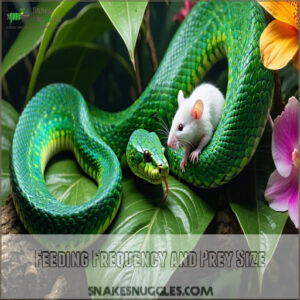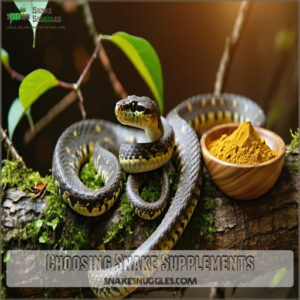This site is supported by our readers. We may earn a commission, at no cost to you, if you purchase through links.

These nutrients work together to build strong bones and prevent health issues.
The right ratio of calcium to phosphorus (2:1 or 3:1) is key.
Vitamin D3, boosted by UVB lighting, aids calcium absorption.
Trace minerals like iron, zinc, and copper are also important.
Iron supports healthy red blood cells, while zinc boosts immunity.
Copper is essential for strong bones and a healthy nervous system.
Gut loading prey with nutrient-rich foods provides an extra boost.
Keep reading to learn more about these essential vitamins and how to make certain your snake gets the right nutrients.
Table Of Contents
- Key Takeaways
- Snake Vitamin Requirements
- Healthy Snake Nutrition Guide
- Choosing Snake Supplements
- Snake Nutritional Deficiencies
- Environmental Factors and Nutrition
- Frequently Asked Questions (FAQs)
- What vitamins do snakes need?
- What is a healthy snake nutrition guide?
- Do snakes need vitamin D?
- Do snakes need minerals?
- Do hognose snakes need supplements?
- What is the best diet for a snake?
- What are healthy snacks with lots of vitamins?
- What is the healthiest thing to eat for a snack?
- Which vitamin is good for eating food?
- What are the best high nutrient snacks?
- Conclusion
Key Takeaways
- To keep your snake healthy, focus on providing the right balance of calcium, phosphorus, and vitamin D3. These work together to build and maintain strong bones.
- Trace minerals like iron, zinc, and copper are also essential for your snake’s overall health and wellbeing.
- UVB lighting is important as it aids in vitamin D3 synthesis, which in turn helps with calcium absorption.
- A well-balanced diet for your snake should include a variety of prey items to ensure they get all the necessary nutrients. Offer whole prey like rodents or birds, matched to their size, and consider gut-loading their food with nutrient-rich foods for an extra boost.
Snake Vitamin Requirements
Keeping your pet snake healthy and happy means ensuring they get the right vitamins and minerals.
You’ll learn about the specific nutrients your scaly friend needs to thrive, from calcium and phosphorus to vitamin D3 and trace minerals, and how to make sure they get enough of each in their diet.
Essential Nutrients for Snakes
You want your pet snake to thrive, and that means nailing their nutrition.
Essential nutrients for snakes include calcium and phosphorus for strong bones, with an ideal ratio of 2:1 or 3:1.
Vitamin D3, aided by UVB lighting, is vital for calcium absorption.
Don’t forget trace minerals like iron, zinc, and copper, which all play a role in keeping your snake healthy.
Get these basics right, and you’re well on your way to being an exceptional snake parent.
Role of Calcium and Phosphorus
Calcium and phosphorus are BFFs in relation to your snake’s bone health.
Here’s the lowdown on why these minerals are top dogs:
- Bone Health: Calcium and phosphorus work together to build strong bones.
- Mineral Balance: Aim for a 2:1 or 3:1 calcium-to-phosphorus ratio.
- Nutrient Absorption: Calcium needs phosphorus to be absorbed properly.
- Calcium Ratio: Too much phosphorus can lead to calcium deficiencies.
- Phosphorus Levels: Keep an eye on levels to maintain the right balance.
Importance of Vitamin D3
Vitamin D3 is key to your snake’s health.
It helps with calcium absorption, promoting strong bones and preventing metabolic bone disease.
Known as the "sunshine vitamin", it’s produced by the body with the help of UVB lighting.
This vitamin is especially important for reptiles like snakes, who may not get enough from their diet alone, so make sure your scaly friend gets their daily dose of Vitamin D3.
Trace Minerals for Overall Health
Hey, we’ve talked about the sunshine vitamin—now let’s chat about other key players in your snake’s health: trace minerals.
These tiny powerhouses pack a punch in maintaining your slithery friend in tip-top shape.
Here’s the lowdown:
- Iron guarantees healthy red blood cells, giving your snake energy to explore (or lounge) all day.
- Zinc boosts immunity and supports healthy skin and scales.
- Copper is essential for strong bones and a healthy nervous system.
- Manganese helps your snake produce energy and keeps its metabolism humming along nicely.
The right balance of these minerals, along with calcium and phosphorus, is key to your snake’s overall health and happiness.
A well-planned diet that includes snake vitamin supplements can help prevent common health issues in snakes.
Healthy Snake Nutrition Guide
As a snake parent, you know that keeping your scaly friend healthy is a top priority.
This guide will help you navigate the ins and outs of snake nutrition, ensuring your pet gets the vitamins and minerals they need for a long and healthy life.
Species-Specific Dietary Needs
Now, let’s slither into the specifics of what different species of snakes like to munch on.
Snake feeding habits vary, from garter snakes gobbling up earthworms to king cobras chowing down on other snakes.
Some, like ball pythons, stick to a diet of rats and mice, while constrictors wrap their meals in muscular coils.
It’s a diverse menu out there, and understanding species-specific dietary needs is key to keeping your pet healthy.
To better care for your pet, researching snake species diet is essential for providing the right nutrients and food.
Feeding Frequency and Prey Size
So, you’ve got a snake, and you want to make sure it’s eating enough – but not too much.
You’re on the right path, my friend.
Here’s the lowdown on feeding frequency and prey size:
- Snake Growth Rates: Younger snakes need to eat more often since they’re growing like crazy.
- Prey Size Guidelines: Match prey size to your snake’s widest part.
- Feeding Schedules: How often you feed depends on your snake’s age and size.
- Meal Frequency: You don’t want your snake to turn into a hungry, hangry monster.
So, feed ’em right, and they’ll be happy campers.
Now, let’s slither onto the next topic and talk about…
Balanced Diet for Overall Wellness
A balanced diet is key to your snake’s overall wellness.
You want your slithery friend to be healthy and happy, so offer a variety of prey items to hit all their nutrient needs.
It’s like us humans eating a rainbow of foods—a colorful diet keeps things interesting and nutritious!
| Wellness Strategies | Snake Nutrition | Reptile Vitamins |
|---|---|---|
| Dietary Variety | Offer different prey types to guarantee a range of nutrients. | N/A |
| Nutrient Balance | Aim for a 2:1 or 3:1 calcium to phosphorus ratio. | Calcium and phosphorus supplements help balance diets. |
| Healthy Feeding | Match prey size to your snake’s girth. | N/A |
This table outlines key strategies for maintaining your snake’s health, including dietary variety, nutrient balance, and healthy feeding practices.
Gut Loading Prey for Nutrient Boost
Gut loading" is a smart strategy to boost your snake’s nutrition.
It’s all about giving their prey a nutrient-rich meal first, so those benefits trickle down to your pet.
Here’s how to do it right:
- Pick the Right Prey Food: Go for nutrient-dense foods like dark, leafy greens and calcium-rich fruits and veggies.
- Supplement Smart: Dust their meals with calcium and reptile nutrition supplements for an extra kick.
- Timing is Key: Offer a gut-loaded meal 24 hours before feeding your snake. This gives the prey time to, well, digest.
- Variety is the Spice of Life: Mix up the menu to cover all their nutritional bases.
- Keep it Fresh: Only feed your snake prey that’s still wiggling. Stale meals lose nutrients fast.
Choosing Snake Supplements
Choosing the right supplements for your scaly friend is a vital part of responsible snake ownership.
We’ll guide you through the ins and outs of selecting the best vitamins and supplements to keep your pet healthy and happy.
Calcium Supplements for Strong Bones
A well-rounded diet is key, but sometimes your snake needs an extra boost.
Calcium supplements play a significant role in snake nutrition, especially for strong bones. You can find a variety of snake calcium supplements online.
| Calcium Sources | Bone Health Tips |
|---|---|
| Powdered Supplements | Dust prey for easy absorption |
| Calcium-rich Foods | Offer variety for mineral balance |
| Cuttlebone | Provides calcium for gnawing |
| Liquid Calcium | Less common, ask your vet |
Remember, proper calcium for snakes, combined with a good calcium phosphorus balance, contributes to a healthy, happy snake. Don’t underestimate the power of calcium supplements in maintaining your snake’s bone health and preventing calcium deficiency!
Vitamin D3 for Calcium Absorption
Vitamin D3 is key for your snake’s bone health, acting like a calcium escort into the bloodstream.
Without enough vitamin D3, calcium for snakes can’t be absorbed properly, hindering bone growth and overall mineral balance.
Providing the right amount of vitamin D3 for snakes guarantees efficient calcium absorption and supports strong bones, contributing to their overall nutrient uptake and well-being.
For a detailed guide, explore essential snake vitamin supplements.
A proper mineral balance, including calcium and vitamin D3, is essential for your snake’s bone health.
Reputable Brands for Supplements
So, you’re ready to pick out some vitamins? Finding superior snake vitamin brands can feel like traversing a jungle.
Look for reptile vitamins from reputable sources. Consider brands like RepCal with Herptivite and Zoo Med with ReptiVite, known for their product safety and ingredient quality.
Always check supplement reviews and brand comparisons, focusing on manufacturing standards. Choosing wisely guarantees your snake gets the best!
When selecting vitamins, consider the importance of immune support systems to maintain your pet’s overall health.
Proper Dosage and Administration
Nobody wants a vitamin overdose! Dosage control is key.
For vitamin D3 for snakes and other supplements, follow these administration tips to prevent issues like vitamin D3 toxicity:
- Match the supplement dosage to your snake’s size.
- Understand supplement timing – don’t overdo it!
- Avoid measurement errors; use accurate tools.
- Overdose prevention is vital. Double-check the snake vitamin dosage. Too much of a good thing can be bad!
Proper snake vitamin dosage guidelines are essential for maintaining your pet’s health and preventing potential risks associated with vitamin supplements.
Snake Nutritional Deficiencies
You’ll want to keep a close eye on your snake for any signs of nutritional deficiencies, as they can lead to some serious health problems.
Catching these issues early is key to keeping your slithery friend happy and healthy, so let’s learn how to spot and address them, focusing on serious health problems.
Common Deficiencies and Health Issues
Nutritional deficiencies, like a snake shedding its skin, can cause serious health disorders.
Dietary problems, especially nutrient imbalance, can lead to metabolic issues like metabolic bone disease.
Common snake vitamin deficiencies include calcium deficiency and low vitamin D3 for snakes, contributing to snake malnutrition and other health disorders.
Early Detection and Correction
Keeping a close eye on your snake’s health is key to spotting vitamin deficiencies early.
Watch for deficiency signs like weak bones, poor shedding, and appetite changes.
Regular weight checks and body condition scoring are a must.
Fecal exams and blood work can also reveal nutritional issues.
Correct with a balanced diet, gut-loaded prey, and calcium supplements.
Prevention is key: monitor health, provide UVB lighting, and maintain proper humidity.
Veterinary Intervention for Severe Cases
In cases of severe nutritional deficiencies in snakes, veterinary intervention is a must.
If your snake’s health takes a turn for the worse, don’t hesitate to get expert help.
A vet will assess the situation with blood work and a physical exam, providing critical care management for issues like metabolic bone disease or a vitamin deficiency.
In extreme cases, your snake might even need hospitalization for emergency care and monitoring.
Regular Health Checks and Monitoring
Everyone needs a game plan for snake health monitoring, and regular check-ups are your best defense against nutritional issues.
Here’s what experienced snake owners track to keep their pets thriving:
- Record feeding responses and weight changes monthly – sudden shifts can signal health problems that need vet attention
- Check their body condition score and watch for unusual behaviors during handling sessions
- Schedule routine fecal exams and blood work to catch deficiencies early
Monitoring for signs of snake nutritional deficiencies is essential for maintaining peak health in pet snakes, and understanding nutritional issues can help prevent problems, ensuring your pet remains in good body condition.
Environmental Factors and Nutrition
You’ll be amazed at how your snake’s environment directly affects its ability to process vitamins and maintain peak health.
Just like you wouldn’t expect to digest a meal properly in a freezing cold room, your scaly friend needs the right temperature, humidity, and UVB lighting to turn those nutrients into building blocks for a healthy life.
UVB Lighting for Vitamin D3 Synthesis
After spotting nutritional gaps, let’s look at how lighting plays into your snake’s health.
While most snakes get vitamin D3 from their prey, research on corn snakes and pythons shows UVB lighting can boost their D3 levels naturally.
For a detailed guide, explore best lighting for snake vivarium health.
It’s a safer way to manage vitamin D3 than relying solely on supplements, plus low levels of UVB help regulate normal activity and mating behaviors.
Humidity and Temperature Control
Proper temperature control, including thermal gradients, is essential for reptile health.
Avoid temperature fluctuations to keep your snake comfortable and digesting properly.
Maintaining correct humidity levels prevents dehydration and promotes healthy shedding.
Monitor humidity levels and temperature regularly to confirm proper snake hydration and overall well-being.
Follow expert snake care tips and reptile nutrition advice for a thriving pet.
Prey Selection and Rotation
How do you pick the perfect meal for your slithery friend?
Match prey size to your snake’s girth, and offer a variety of prey items – think prey variety buffet! – and rotate (feed rotation) those prey types to guarantee nutrient balance.
Consider your snake’s preferences and always prioritize prey quality. Don’t forget gutloaded prey for an extra nutritional boost!
Adjusting Diets for Senior Snakes
As your slithery friend ages, senior snake care becomes more specialized.
You’ll need to adjust their diet to meet evolving nutritional requirements, and consult a vet for personalized advice.
Opt for high-quality senior snake food to guarantee they get all the essentials, and keep an eye on their weight and overall health.
Adjust their diet to address age-related issues like osteoarthritis, and don’t forget to include joint supplements, hydration, and low-impact exercises for their golden years.
Frequently Asked Questions (FAQs)
What vitamins do snakes need?
Think of vitamins as the spark plugs for your snake’s engine. They need D3 for calcium absorption, plus other vitamins like A, C, and E. Don’t forget essential minerals, too!
What is a healthy snake nutrition guide?
You’ll want to nail your snake’s diet with whole prey, like rodents or birds, dusted with calcium and vitamin D Don’t forget occasional vet checkups!
Do snakes need vitamin D?
Yes, vitamin D is essential for your snake’s health.
It helps with calcium absorption and bone growth, preventing metabolic bone disease.
UVB lighting is key to vitamin D3 synthesis, promoting strong, healthy bones.
Do snakes need minerals?
Snakes need minerals like we need, well, coffee.
Calcium and phosphorus are essential for bone health, with a 2:1 or 3:1 ratio being ideal.
Vitamin D3, aided by UVB light, facilitates calcium absorption, and other key minerals include iron, zinc, and copper.
Do hognose snakes need supplements?
Hognose snakes have specific dietary needs, and while they’re not typically deficient in vitamins, they may need calcium supplements, especially if they’re fed a fish-heavy diet.
What is the best diet for a snake?
How do you keep your scaly friend healthy and happy?
A balanced diet is key.
Offer whole prey, like rodents or birds, matched to their girth.
Calcium, phosphorus, and vitamin D3 are essential, with supplements as needed.
What are healthy snacks with lots of vitamins?
Snack time, but make it healthy!
Offer your slithery friend some calcium-rich treats like dusted insects or hairless rat pups.
Throw in some vitamin D3 for good measure and bone health.
What is the healthiest thing to eat for a snack?
You’re probably thinking, ‘An apple a day keeps the doctor away,’ but let’s be real—sometimes you crave something more.
Try these nutritious options: Greek yogurt with berries, homemade trail mix, or hummus with veggie sticks.
Which vitamin is good for eating food?
Vitamin D3 is the sunshine vitamin, essential for you to absorb calcium and promote strong, healthy bones.
It’s like a bouncer at a club, making sure calcium gets in and does its job.
What are the best high nutrient snacks?
Snakes love a tasty, nutritious treat, but what’re some options for a high-nutrient snack?
Go for whole prey like rodents or birds, they’re like nature’s very own protein bars, perfect for muscle-building and overall health.
Conclusion
You’re now equipped with the know-how to keep your scaly friend thriving.
The best vitamins for healthy snakes revolve around calcium, phosphorus, and vitamin D3, with a supporting cast of trace minerals.
It’s a delicate balance, but with this guide, you can confirm your pet gets the right nutrients.
Remember, a healthy snake is a happy snake, and a happy snake makes for an even happier snake owner!
- https://animals.mom.com/snakes-need-vitamins-10902.html
- https://www.reptileforums.co.uk/threads/vitamin-supplements-for-snakes.215836/
- https://www.aussiepythons.com/threads/supplements-for-snakes.179051/
- https://www.petsmart.com/reptile/vitamins-and-supplements
- https://www.webmd.com/balance/bee-pollen-benefits-and-side-effects

















